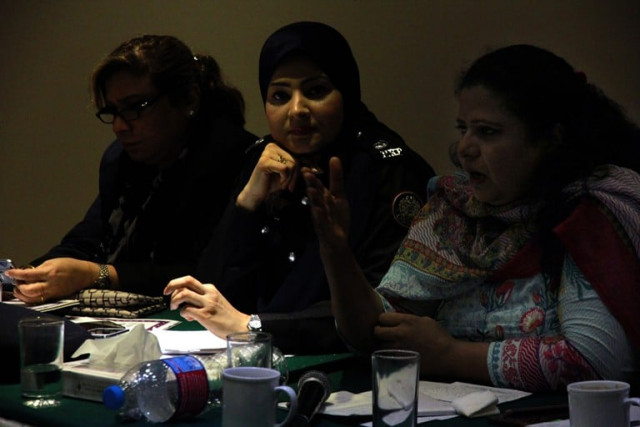‘The key to implementation of pro-women laws is coordination’
Police, civil society and lawyers must come together to address gender-based violence

The police are committed to curbing all types of crime from society despite our limited resources but before pointing fingers, people should try to understand the problems we go through, said City SP Shehla Qureshi. PHOTO: ATHAR KHAN/EXPRESS
This was said on Wednesday by experts at a consultative session organised by Rozan Pakistan with police and other stakeholders to identify challenges in the implementation of pro-women laws in Pakistan. The seminar was held to identify ways of increasing police engagement in addressing cases of gender-based violence and to discuss ideas for an advocacy campaign for better implementation of the laws.
Rozan Pakistan Programme Manager Safi Peerzada said that the organisation has been hosting workshops and training sessions in coordination with the police department for the past 18 years and realised the need to organise a consultative seminar on this issue, which is directly related to the police.
He pointed out that initially they examined the difficulties faced by the police department in handling such cases, as they have limited resources to deal with an unlimited number of responsibilities.
He added that issues related to gender-based violence and other crimes against women are very sensitive and therefore require a lot of understanding in order to handle the matter properly.
Women forge alliance for safe workplaces
Referring to on the issues related to police department, Peerzada said that every year there are multiple laws passed by the assembly and police personnel should therefore be briefed and trained according to the latest laws so that they can handle issues accordingly.
City SP Shehla Qureshi shared that there are some issues in society that the police department cannot deal with alone. She said many sensitive issues, such a gender-based violence, child marriages and implementation of pro-women laws, could only be resolved if civil society, prosecutors and lawyers work together. The officer said that the police department is committed to curbing all types of crime from society despite its limited resources but before pointing fingers, people should try to understand the problems the police personnel go through.
Another point Qureshi raised was that in many cases, when the police was close to proving the suspect’s guilt in court, the victim and their family opt to compromise with the suspects, which is demoralising for the police.
ICST urges govt to empower women
Shedding light on existing pro-women laws, regional programme coordinator Malka Khan shared that the issue remains the same. We always manage to pass laws but lag behind in implementing them, she said. Khan added that it takes a long time for non-governmental organisations and civil society to advocate for different laws and push assemblies to pass them, but once the laws are passed, the real challenge of implementation starts.
She spoke about the recently passed Hindu marriage law and said, "Only people belonging to the Hindu community can express their happiness and satisfaction with this law, as now they have legal proof of their marriages, which helps them in legal matters”. She said in the past the Hindu community faced a number of issues when applying for visas, immigration or dealing with other legal affairs.
Khan also brought up the issues faced by rape and acid attack victims in society. She related the tale of how an acid attack victim was humiliated at hospital by a nurse after she asked her to carefully bandage her wounds. The nurse scathingly told her that she must have done something wrong to have been ‘punished’ with acid and should not expect sympathy.
Empowering women: Girl guides armed with skills
Khan concluded that civil society must also help the police department resolve the issues they are currently facing, as this will help them work together closely in the future and ensure better coordination between all the departments.



















COMMENTS
Comments are moderated and generally will be posted if they are on-topic and not abusive.
For more information, please see our Comments FAQ